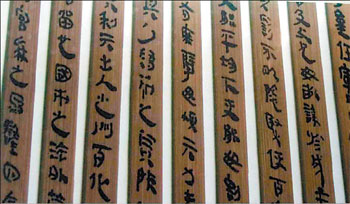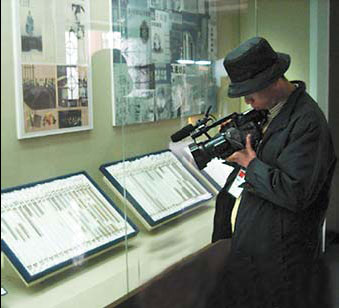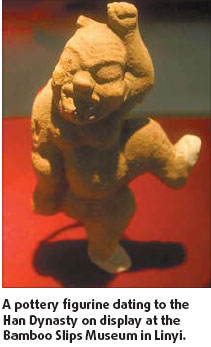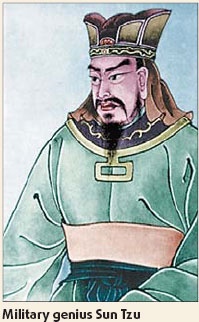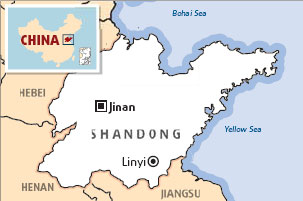More than 7,500 bamboo slips unearthed in an ancient tomb at the foot of the Yinque Mountain have made the city of Linyi, in East China's Shandong Province, a magnet for archaeologists and tourists.
Replicas of ancient bamboo slips feature texts from Sun Tzu: The Art of War. File photos
Dating back to the Western Han Dynasty (206 BC-AD 24), these strips, covered in finely written words, included portions of known texts, as well as a number of previously unknown texts from two Chinese military classics - Sun Tzu: The Art of War (Sunzi Bingfa) and Sun Bin: The Art of War (Sunbin Bingfa).
Internationally recognized as the earliest theoretical work on military strategy and a sparkling gem in the treasure of the Chinese cultural heritage, The Art of War is commonly attributed to Sun Tzu, a general living in the State of Wu during the Warring States Period (475-221 BC).
The unearthed strips have helped Chinese archaeologists confirm parts of Sun Tzu's classic which were already known and, more importantly, have added new sections of Sun Bin's works, which had been lost for more than 1,400 years.
"The discovery sheds new light on the life of Sun Tzu and his contribution to China's military history," says Wang Bing, a guide of Yinque Bamboo Slips Museum, located at the foot of the Yinque Mountain in Linyi. "It ends doubts about the historical existence of Sun Tzu held by many Chinese historians for centuries."
A visitor takes a close look at the unearthed bamboo slips dating to the Western Han Dynasty (206 BC-AD 24).
One of the prevalent theories in the early 20th century was that Sun Tzu was actually Sun Bin. However, the bamboo strips provided evidence that they were two different strategists in the Warring States Period who had written two different military books, Wang explains.
Sun Bin, a descendent of Sun Tzu, focused more on the practical matters of warfare in his book, rather than military strategy as did Sun Tzu's work.
The ancient tomb in Linyi was first found by a local worker in April of 1972, and the site was listed as one of the 100 Major Archaeological Discoveries of the 20th century in China.
"It's really surprising to find that the ink on the bamboo slips is still clear and discernable after being buried in the earth for about 2,000 years," Wang says.
Each bamboo strip is about 28 centimeters long, 0.7 centimeter wide and 0.2 centimeter thick. The characters on the bamboo slips are written in lishu, a style of Chinese calligraphy from the Han Dynasty.
In addition to the bamboo slips, archaeologists also excavated 98 buried objects, including pottery, lacquer, bronze ware, chestnuts and peach cores, at the ancient site.
"Experts find it difficult to identify the owner of the tomb," Wang says.
Since no weapons were found in the tomb, experts presumed that the owner was supposed to be a civilian working in military affairs and studied in the art of war, due to the bamboo-slips version of military works, Wang adds.
Since opening in 1989, the 10,000-square-meter museum has attracted hundreds of military researchers every year. In May, more than 120 military officers from 58 countries who studied in Nanjing Army Academy paid a visit to the museum. Soldiers from West Point Military Academy in the United States also visited the museum in July of 2005.
The museum, however, is not just a place of great interest to the military world. It is now attracting attention from tourists. In recent years, the local government has restored some significant sites and reconstructed basic facilities.
The museum is characterized by classical palace-like architecture and gardens with promenade corridors, clear water and shade trees. The Hall of Han Tomb and Bamboo Slips Exhibition Hall are its main buildings.
The Bamboo Slips Exhibition Hall on the second floor displays the valuable cultural relics which provide the important materials to study politics, economics, military affairs and culture in the early Han Dynasty.
Influencing soldiers and CEOs
Sun Tzu: The Art of War is the earliest and most valuable Chinese treatise on military science, dating from the late Spring and Autumn Period (770-476 BC). The book is a condensation of the experience of warfare in that era, with the emphasis on precautionary and intelligence strategies.
Because it reveals the nature and important rules of warfare, the book has had a tremendous influence on military, political and philosophical thought in China. Down the ages, it has been called a "military classic", and its author has been called a "military genius".
This work, now more than 2,000 years old, has been translated into various languages since the 17th century and even today, has a profound influence all over the world.
The influence of Sun Tzu's text has grown tremendously in the West in recent years, with military leaders, politicians and corporate executives alike finding valuable insight in these ancient words.
Getting there
It's convenient to get to Linyi, of Shandong Province, either by plane or by train from major cities. The city is about a four-hour ride from Jinan, capital of Shandong. Located in southern part of the province, Linyi is becoming known as a tourist destination with its beautiful landscapes and wealth of cultural heritage.
In addition to the Yinque Bamboo Slips Museum, tourists can also explore the Mengshan Mountain or pay a visit to the residence of Wang Xizhi (AD 303-361), arguably China's greatest ancient calligrapher.
(That's Shanghai September 20, 2007)

